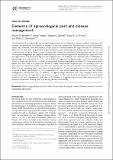Elements of agroecological pest and disease management

View/
Date
2022-06-01Author
Belmain, Steven
Tembo, Yolice
Mkindi, Angela
Arnold, Sarah
Stevenson, Philip
Metadata
Show full item recordAbstract
The development of large-scale monocropped agrisystems has facilitated increased problems with pests and
diseases, perpetuating the reliance of farmers on synthetic pesticides. The economic success of synthetic
inputs has, however, been achieved at a high cost to the environment through the loss of biodiversity,
depletion of soil quality, greenhouse gas emissions, and disrupting the ecosystem services that can
otherwise help mitigate losses caused by pests and diseases. Environmentally benign alternatives for pest
and disease management are urgently needed and are now widely recognized as essential for sustainable food
and agriculture. The Food and Agriculture Organization, for example, has published the 10 elements of
agroecology as a framework for the transformation of agriculture. Agroecology combines ecological and
social concepts and principles to develop sustainable food and agricultural systems by harnessing nature based solutions that are tailored to farmers’ needs. Plant-based biopesticides, for example, offer an
alternative to synthetic pesticides that are less harmful to the environment and nonpersistent, yet
effective at managing pests and have a long tradition of use among farmers so are more socially
acceptable. Here, we provide a critical assessment of how nature-based approaches to pest and disease
management comply with the 10 elements of agroecology and show how they integrate with other
ecosystem services through farmer participatory research. We conclude that the adoption of nature-based
solutions for pest management addresses all 10 elements of agroecology and provides an entry point to
promote sustainable farming practices among farmers more widely.
URI
https://doi.org/10.1525/elementa.2021.00099https://dspace.nm-aist.ac.tz/handle/20.500.12479/1864
